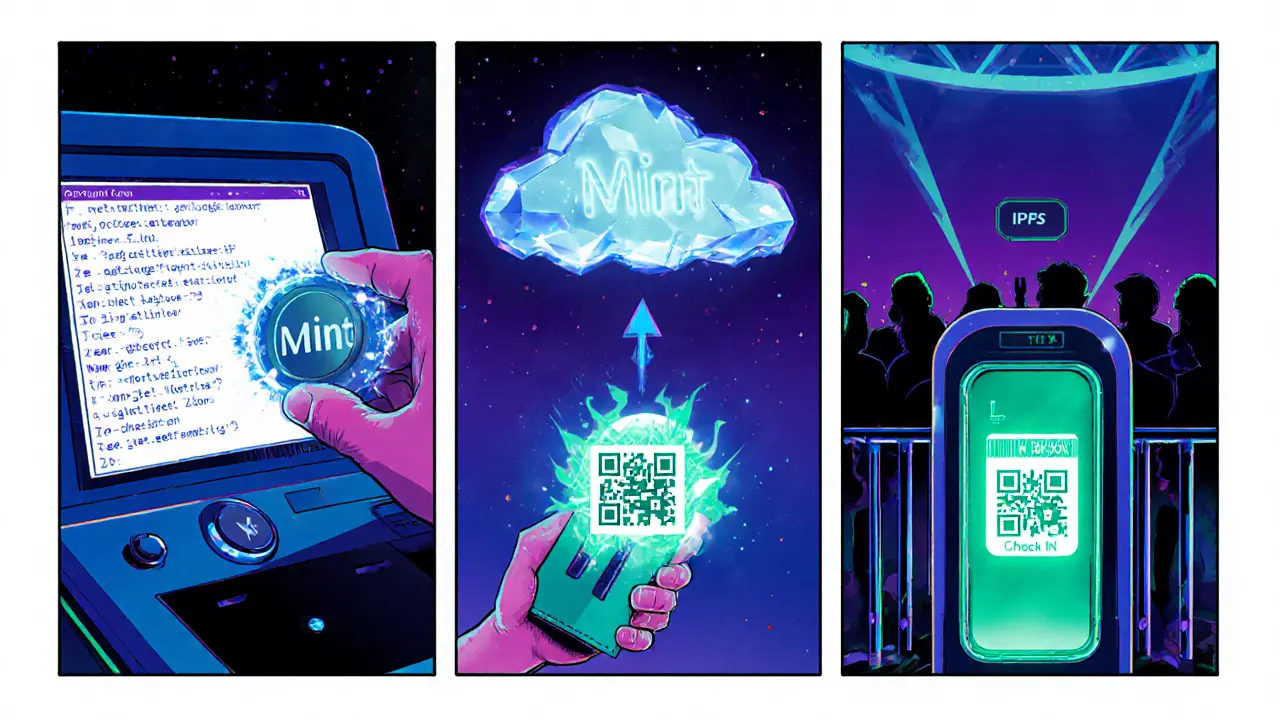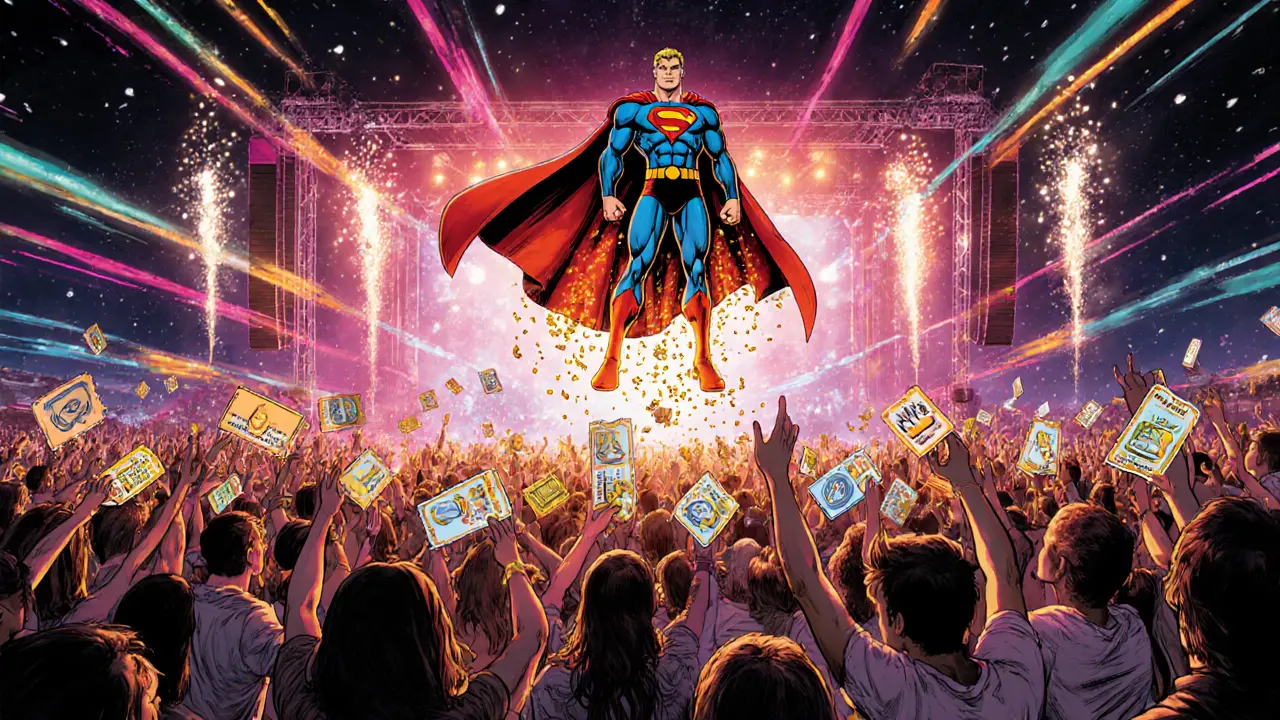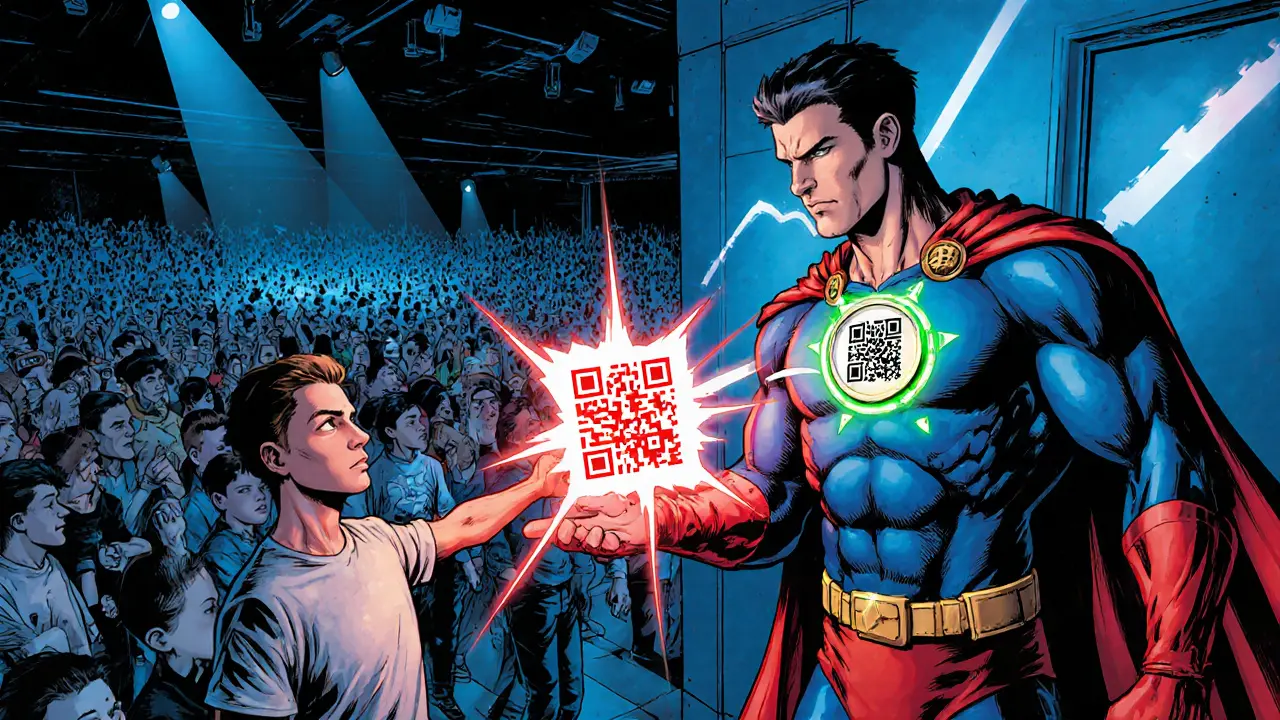Ever waited in line, only to see a friend scroll past a fake QR code and get in before you? That nightmare sparked a new wave of tech: NFT ticketing. By turning each ticket into a unique digital asset on a blockchain, organizers can finally kick counterfeit tickets, scalpers, and opaque resale markets to the curb.
Key Takeaways
- NFT ticketing uses blockchain (mainly Ethereum) and the ERC‑1155 standard to create tamper‑proof tickets.
- Smart contracts automate sales, royalties, and entry verification, eliminating most middle‑man fees.
- Dynamic QR codes refreshed every few seconds stop replication attacks.
- Fans keep a lasting digital collectible that can unlock future perks or resale royalties.
- Challenges include wallet onboarding, gas fees, and venue‑side infrastructure.
What Exactly Is NFT Ticketing?
In simple terms, NFT Ticketing is a blockchain‑based system that mints each event ticket as a non‑fungible token, giving it a unique cryptographic identity. Because the token lives on a public ledger, anyone can verify its authenticity without contacting a central ticketing agency.
How the System Works - Step by Step
- Minting the Ticket: Organizers deploy a Smart Contract code that defines ticket price, seat, date, and any extra utilities like backstage access on a blockchain.
- Storing Metadata: Details (event name, seat number, artwork) are uploaded to IPFS a decentralized file system that generates a cryptographic hash for immutable storage.
- Buying the Ticket: Fans purchase the NFT via a crypto or fiat gateway. The smart contract mints the token to the buyer’s Digital Wallet software like MetaMask that holds private keys and displays owned NFTs.
- Dynamic QR Generation: The wallet creates a Dynamic QR Code a time‑based QR that refreshes every 30 seconds, linked to the token ID for entry.
- Venue Verification: Scanners read the QR, the system queries the blockchain (or a Layer‑2 cache) to confirm ownership, and the gate opens.
- Secondary Market & Royalties: If the holder resells the ticket, the smart contract automatically sends a 5‑15% royalty back to the event organizer.
The Technical Backbone
Most live‑event projects today build on Ethereum the leading smart‑contract platform that hosts millions of NFTs because of its robust developer ecosystem and mature tooling. The preferred token standard is ERC‑1155 a multi‑token standard that lets a single contract manage dozens of ticket types while keeping gas costs low. For high‑traffic festivals, organizers often layer a Layer‑2 scaling solution-such as Polygon or Optimism-to process entry checks in sub‑second time frames without spiking fees.

Security Benefits Over Traditional Tickets
Traditional paper or static QR tickets suffer three big problems: they can be copied, they can be sold multiple times, and there’s no built‑in way to track resale. NFT ticketing solves each:
- Counterfeit Proof: Each token’s hash is verified on‑chain, so a fake QR simply won’t match any token ID.
- No Double‑Spending: Once the smart contract marks a token as "checked‑in," any further scan fails instantly.
- Transparent Resale: The blockchain logs every transfer, and built‑in royalties enforce a fair cut for the organizer.
- Dynamic QR Codes (refresh every 30 seconds) add a time‑sensitive layer that static codes can’t match.
From Ticket to Digital Collectible
Because the NFT lives on a public ledger, it doesn’t disappear after the show. Artists are already turning tickets into "proof‑of‑attendance" badges, exclusive video drops, or future‑discount vouchers. A fan who bought a Coachella pass in 2025 might later receive an airdropped backstage clip, and the same token can be traded on OpenSea for a profit-while the original promoter still earns a royalty.
Implementing NFT Ticketing: A Checklist for Organizers
- Choose a Blockchain: Ethereum for security, Polygon for cheap, fast transactions, or a hybrid approach.
- Select a Token Standard: ERC‑1155 is the go‑to for multi‑ticket events.
- Develop or License a Smart Contract: Use a white‑label solution from platforms like SeatlabNFT or ComeTogether to cut development time.
- Upload Metadata to IPFS: Include artwork, seat map, and any extra utilities.
- Set Up a Wallet Integration: Provide step‑by‑step guides for MetaMask, Trust Wallet, or mobile‑first wallets that hide private keys.
- Configure Dynamic QR Generation: Tie the QR to the token ID and a timestamp, refreshing every 30 seconds.
- Test Venue Scanners: Simulate 5,000 concurrent check‑ins to ensure sub‑2‑second response times.
- Plan for Gas Fees: Offer gas‑sponsorship for low‑value tickets or use layer‑2 to reduce costs.
- Communicate Benefits to Fans: Highlight anti‑scalping, royalties, and future perks.
- Launch & Monitor: Track on‑chain events, watch for failed scans, and have a support line for wallet issues.

Common Challenges and How to Overcome Them
| Challenge | Practical Solution |
|---|---|
| Non‑crypto users struggle with wallet setup | Provide a guided onboarding flow, include QR‑code wallet installers, and offer a “guest” wallet that abstracts private keys. |
| High gas fees during network spikes | Deploy on a Layer‑2 (Polygon) or batch mint tickets in off‑peak windows. |
| Venue Wi‑Fi can’t handle thousands of blockchain queries | Cache verification data locally and only commit a final "checked‑in" transaction to the chain. |
| Regulatory uncertainty about crypto payments | Accept fiat via a payment gateway that handles crypto conversion on the backend. |
Future Outlook - Where Is NFT Ticketing Heading?
Analysts at Gartner predict that by 2027, up to 40% of major music festivals will embed some form of NFT ticketing. The next wave will likely bring cross‑chain tickets (Ethereum, Solana, Tezos) that let fans pick their preferred network, and deeper gamified experiences-think loyalty points that earn you backstage passes after attending three shows.
As layer‑2 solutions become mainstream, the cost of scanning a ticket will drop to pennies, making the tech viable even for community theatre. Meanwhile, artists will see a new revenue stream from post‑event collectibles, turning a single concert into a year‑long engagement loop.
Frequently Asked Questions
Can I use a regular digital ticket app for an NFT ticket?
Not yet. NFT tickets require a wallet that can read the token and generate the dynamic QR. Some apps are adding wallet‑like features, but a dedicated crypto wallet is still the most reliable option.
Do I have to pay gas fees when I buy a ticket?
If the event lives on Ethereum Mainnet, yes-each mint or transfer incurs gas. Many organizers cover these fees for low‑priced tickets or use Polygon, where fees are a fraction of a cent.
What happens if my wallet crashes at the venue?
A good implementation stores a signed receipt of your token ID on the venue’s server when you check in. Even if your wallet goes offline, the staff can pull the receipt to verify you’ve already entered.
Can I resell my NFT ticket?
Absolutely. Transfer the token on an NFT marketplace like OpenSea. The smart contract will automatically send the organizer’s royalty on each resale.
Is NFT ticketing environmentally friendly?
Proof‑of‑work chains have a larger carbon footprint, but most ticketing projects now run on proof‑of‑stake or layer‑2 chains, which cut energy use by over 99% compared to early Ethereum.


Natasha Nelson
October 24, 2025 AT 12:00Finally a ticket that won't get copied!!!
Sarah Hannay
October 25, 2025 AT 04:40The adoption of NFT ticketing marks a pivotal shift in how live events manage entry and resale. By encoding each ticket as a unique token on a public ledger, organizers gain immutable proof of authenticity. This eliminates the longstanding problem of counterfeit QR codes that plague venues worldwide. Smart contracts enforce a one‑time validation, ensuring that once a token is scanned it cannot be reused. Moreover, the built‑in royalty mechanism guarantees that secondary market sales continue to benefit the original promoter. Dynamic QR codes, refreshed every thirty seconds, add a temporal layer of security unattainable with static barcodes. While the technology introduces added complexity for non‑crypto‑savvy attendees, comprehensive onboarding can mitigate that friction. Layer‑2 solutions such as Polygon dramatically lower gas costs, making micro‑transactions feasible for low‑priced tickets. Storing metadata on IPFS guarantees that the artwork and seat information remain tamper‑proof and permanently accessible. The transition to proof‑of‑stake networks further reduces the environmental impact compared to legacy proof‑of‑work chains. From a fan perspective, the NFT ticket becomes a digital collectible, potentially unlocking exclusive content post‑event. This creates a continuous engagement loop, turning a single concert into a year‑long relationship. Organizers can also leverage the on‑chain data to analyze attendance patterns and improve future event planning. Regulatory considerations remain, but many jurisdictions are clarifying crypto payment frameworks. In summary, NFT ticketing offers a robust solution to fraud, scalping, and opaque resale markets while opening new revenue streams.
Richard Williams
October 25, 2025 AT 21:20Great breakdown! The way smart contracts auto‑handle royalties really empowers creators and cuts out the middleman. I love seeing technology make the fan experience smoother.
Abby Gonzales Hoffman
October 26, 2025 AT 13:00One thing to note is that IPFS hashes are content‑addressed, so if you ever need to update the artwork you’ll have to mint a new token. That’s why many platforms lock the metadata at mint time to keep the token truly immutable.
Rampraveen Rani
October 27, 2025 AT 05:40NFT tickets are super cool 😎 they make scalping a thing of the past 🚀
ashish ramani
October 27, 2025 AT 22:20While the concept is promising, it is essential to provide clear instructions for users unfamiliar with crypto wallets.
Stephanie Alya
October 28, 2025 AT 15:00Oh sure, because paying a few dollars in gas fees is exactly what fans love when buying a cheap concert ticket.
olufunmi ajibade
October 29, 2025 AT 07:40This is a perfect example of tech being used to empower fans instead of exploiting them. If venues don’t adopt it soon, they’ll be left behind.
Manish Gupta
October 30, 2025 AT 00:20The shift toward Layer‑2 solutions also means that venues can handle thousands of scans per minute without bottlenecks.
Gabrielle Loeser
October 30, 2025 AT 17:00Indeed, scaling is vital. Implementing a local cache for verification can further reduce latency while still preserving on‑chain integrity.
Cyndy Mcquiston
October 31, 2025 AT 09:40Sounds like a lot of hype for no real benefit.
Marianne Sivertsen
November 1, 2025 AT 02:20From a philosophical standpoint, turning a ticket into a collectible challenges the notion of a simple transaction and invites a deeper relationship between artist and audience.
Shruti rana Rana
November 1, 2025 AT 19:00✨ The cultural impact of NFT tickets will be profound! Not only do they protect against fraud, they also create a legacy for each attendee. 🎭
Alex Horville
November 2, 2025 AT 11:40Let’s not ignore the fact that many fans prefer traditional tickets; forcing blockchain could alienate a large portion of the market.
Peter Schwalm
November 3, 2025 AT 04:20It's important to balance innovation with accessibility. Providing both NFT and conventional ticket options could cover all user bases.
Petrina Baldwin
November 3, 2025 AT 21:00Just give us a simple guide and we’re good.
Ralph Nicolay
November 4, 2025 AT 13:40While brevity is appreciated, a comprehensive step‑by‑step tutorial is essential for ensuring a smooth user experience across diverse demographics.
sundar M
November 5, 2025 AT 06:20I can see festivals using NFTs to reward repeat attendees with exclusive experiences – think backstage passes after three shows! That’s the kind of excitement we need.
Nick Carey
November 5, 2025 AT 23:00Meh, another tech trend that’ll fade. Let’s see if it actually works before getting hyped.
Sonu Singh
November 6, 2025 AT 15:40i think the main issue is that many people dont knwo **how** to set up a wallet, so simple guides are key.
monica thomas
November 7, 2025 AT 08:20Could the implementation of decentralized ticketing also address accessibility concerns for disabled fans, perhaps by integrating screen‑reader friendly metadata?
Edwin Davis
November 8, 2025 AT 01:00Indeed, the potential is vast, and with proper standards-, security, scalability-, adoption will only accelerate!!!